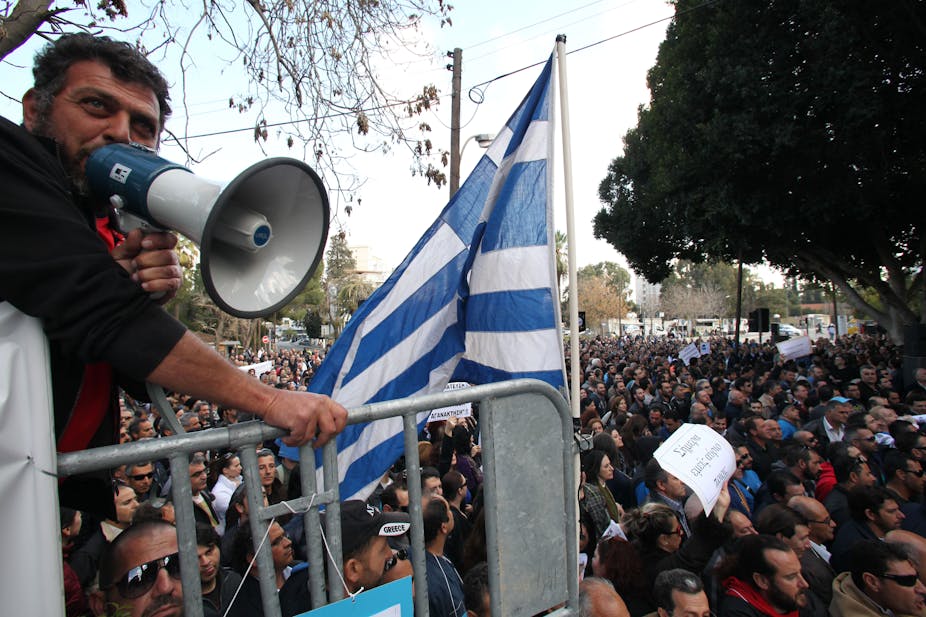More than two years after the Republic of Cyprus entered the eurozone crisis, little has changed. Those responsible for the banking scandals that necessitated a bail-out from the Troika have not yet been prosecuted, nor even clearly identified.
Protest is lacking in dynamism compared to Portugal, Greece, Spain and Italy and unions have failed to agree on a general strike; indeed many more people are participating in charity initiatives than in contentious politics. Apathy and ignorance have so far won the day and public debates remain centred on the national rather than the European arena.
In fact, the only sign of any dynamism in the political scene are the number of different parties, groups and independent candidates taking part in the European Parliament election. With 61 people either endorsed by parties or running as independents, this is the [highest number of candidates] since Cyprus first participated in European elections in 2004.

The range includes the main actors of the so-far frozen Cypriot party system – the right-wing DISY, the left-wing AKEL , the social democrats EDEK in an electoral coalition with the Greens and the centrist nationalist party DIKO. But there are some small emerging protest groups: the anti-corruption Meesage of Hope, the bi-communal DRASy-EYLEM, the Animal Party and the Turkish/Cypriot Socialist Party of Cyprus (KSP) and the far-right ELAM.
Although most of these smaller parties have too few supporters to be included in polls, taken together they signal underlying currents of alternative and niche agendas and issues that have so far been absent from Cypriot politics. The 2014 European elections are also the first such occasion when Turkish Cypriots are running for office either as independents or as part of a (bi-communal or Turkish/Cypriot) platform.
AKEL still losing ground
Cypriot polls, although not to be fully trusted given their previous failings, tell a story of soft but (compared to the past) important realignment. DISY has far climbed by 1.2 points, while AKEL has dropped 8.8 points, a more or less expected result in light of its failings during its first time as the central party of government between 2008 and 2013. With absention forecasted to reach at an unprecedented high, AKEL is in danger of losing its second seat in the European Parliament.
The Social Democrats-Greens combination is behind the combined results of its constituent parties in 2009 but do not worry about their seat, DIKO is more or less holding its ground and new or fringe formations are approaching more than 10%. The turnout - which was at 59% in the 2009 elections – is expected to drop below 50%.

Two things: we’ve seen the growth of a degree of anti-party sentiment in Cyprus, which would account for the emergence of some new non-aligned challengers. And, as in many European countries, the EU parliamentary elections are seen as being of second order importance to national politics – so while in the 2013 presidential elections most people voted for mainstream paries, in the EU poll many are expected to challenge the status quo and what they see as political corruption and incompetence. Whether this is just a kick in the pants for the political establishment or the beginning of something more enduring remains to be seen.
But this has spooked the two main parties – AKEL and DISY – and they’ve opted to field some high-profile candidates to defend themselves against this insurgency in protest votes.
It would be a mistake to read too much into this, however. DISY – the party of government – remains way ahead in the polls and its former leader – now president of the Republic, Nicos Anastasiades -, has managed (with the help of the media) to shrug off the humiliation of March 2013, when he was forced to accept the haircut imposed by the Eurogroup on depositors in Cypriot banks.
AKEL’s anti-austerity message lacks credibility given that it was the first negotiator of the Memorandum of Understanding with the Troika, the first implementer of austerity (between 2011 and 2013) and part of the group of parties voting in favour of most of the Memorandum-related legislation. This is reflected in the party’s lacklustre polling numbers.
Unlike in most of its southern European neighbours, the race for the European election in Cyprus is neither close nor unpredictable. And it is far from certain if the current changes in the number and nature of political forces will be sustained in the long-term and at the systemic level.

